Verizon Wireless iPhone Will Bring Pain to More Than AT&T
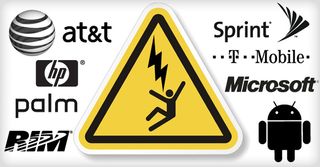
It can’t do voice and data simultaneously. It doesn't have 4G. And you can’t use it overseas. So why is the Verizon Wireless iPhone 4 such a big deal? Because it’s heading to Verizon Wireless, that’s why. This is the network that established its reputation on quality. The one that just added 16 new cell sites in the New York City area alone to fortify its coverage before millions of data-hungry subscribers drop AT&T like a bad habit. In a survey conducted just before Verizon Wireless and Apple made their big announcement, 16 percent of AT&T subscribers said they would switch to Verizon Wireless if they began selling the iPhone. That doesn't seem like a ton, but another 23 percent was undecided. Here’s how I see the Verizon iPhone impact shaking out.
PAIN METER (OUT OF 5)
AT&T
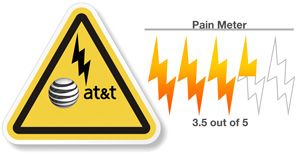
There’s no question that the second largest carrier will lose a sizable number of subscribers in the short term as a result of the iPhone finding a second home. Users are sick of dropped calls and not being able to download data at critical times. However, the long-term damage might not be severe.
First, there are a lot of people still in the middle of the contracts they signed when the AT&T iPhone 4 debuted. Second, AT&T is finally putting its full weight behind Android. At CES, the carrier introduced a flagship Android phone, the Motorola Atrix 4G; it was easily one of the most innovative devices at the show. The carrier’s Google phone selection has been so weak thus far that only 2 percent of Android impressions were measured from this network in January, compared to 55 percent for Verizon. Now AT&T is pushing Android—hard—and it will need to in order to limit the impact of losing iPhone exclusivity.
The big question, though, is not whether AT&T can promote an OS that’s already doing well with other carriers. It’s whether the company can restore its reputation. AT&T says its HSPA+ network is fully deployed (which it is calling 4G), and it will roll out LTE starting mid-year. How well new the 20 promised 4G devices work will determine the lasting impact from the Verizon iPhone fallout.
Android
Stay in the know with Laptop Mag
Get our in-depth reviews, helpful tips, great deals, and the biggest news stories delivered to your inbox.
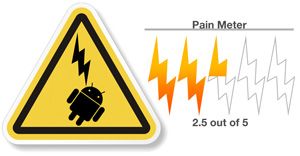
I predict that new smart phone shoppers for Verizon Wireless will choose iOS over Android by a margin of at least 3 to 1 during the first couple of months after launch. The excitement will just be too great. And given that Verizon Wireless sells the most Android phones of any U.S. carrier, Google will definitely feel the pain. But one can’t ignore the momentum Android already has in the market. Plus, Android will be first out of the gate with 4G phones for Verizon, including models with faster dual-core processors. Where Android needs to step its game is its user interface (which Palm exile Matias Duarte is working on feverishly), premium content, and a better selection of games. In other words, the Android ecosystem needs to catch up with the rapidly evolving hardware and network speeds.
Sprint and T-Mobile
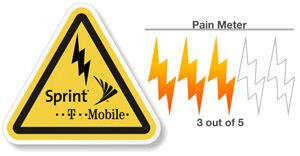
If only Sprint and T-Mobile had AT&T’s problem. It has the hottest selling phone, and they don’t. Could that change? Possibly. But in the meantime, Sprint will need to continue to promote its solid lineup of Android handsets and upcoming tablets such as the BlackBerry PlayBook. And T-Mobile will have to do a better job of convincing the masses that its 4G network is up to snuff. If anything, the Verizon-Apple relationship might accelerate the process of Sprint and T-Mobile tying the knot. Of course, they’ll need to iron out a coherent network strategy, but they may not have a choice.
RIM
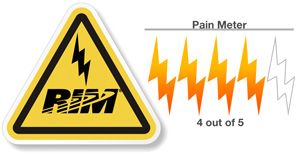
Oh boy. It’s no secret that Verizon Wireless customers have been choosing Android over BlackBerry for months, and now it’s all but guaranteed that it will become the number three platform on Big Red. Based on some leaked info this week—what timing?!—successors to the Torch and Storm with faster processors and higher-res screens are on the way. But unless RIM finds a way to squeeze its slick new BlackBerry Tablet OS from QNX into at least some of these handsets, shoppers may very well give these devices a thumbs down.
HP-Palm

HP is hosting a big event on February 9th to unveil the first webOS products from the company since it acquired Palm. And since the stakes couldn’t be higher, the fact that the Verizon iPhone will go on sale the very next day doesn’t exactly help HP’s cause. People are so excited they’ll probably start lining up at Verizon Wireless stores on the 9th. Talk about screwing with someone else’s news cycle. I still have high hopes for webOS, but it just got more challenging for the platform to stand out in the crowd.
Microsoft
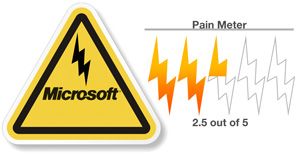
Did you hear that Windows Phone 7 devices were coming to Verizon? You could be excused for letting that news slip through the cracks. Although there’s a lot we like about Microsoft’s revamped mobile OS, it’s still lacking features any modern platform should have. And now that Verizon Wireless will have Android and iPhone, it’s likely a lot of people will simply ignore WP7 when shopping at the nation’s largest provider. Although price cuts on AT&T have probably helped, that alone won’t be enough to move the needle.
